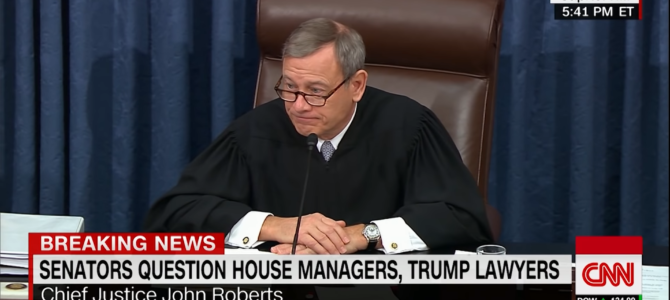Chief Justice John Roberts’ expression was priceless after reading Sen. Elizabeth Warren’s garish question during the Senate impeachment trial Thursday night, a question which lacked any remote sense of self awareness.
The inquiry facetiously read, “At a time when large majorities of Americans have lost faith in government, does the fact that the Chief Justice is presiding over an impeachment trial in which Republican senators have thus far refused to allow witnesses or evidence contribute to the loss of legitimacy of the chief justice, the Supreme Court, and the Constitution?”
The purpose of the question was stunningly obvious. It was to suggest that the only way Chief Justice John Roberts could remotely hold onto any semblance of legitimacy was to ensure the outcome favored by the Democrats came to fruition, an outcome which, given the increasingly likely failed motion, would require Chief Justice Roberts to interfere in a manner that is not explicitly written into the Constitution.
As a seasoned lawyer, she knew precisely the type of question she was asking. One that reached to a sore spot for the Supreme Court and one over which they have continued to opine. The question of how much of a role public faith in the federal judiciary should play in judicial decision-making has been a topic hotly contested. It was scrutinized heavily when it reared its ugly head in Justice O’Connor’s opinion in Planned Parenthood v. Casey, when it appeared alongside a menagerie of other factors that may be considered in the process of determining whether to overrule precedent. It wasn’t regarded as wholly dispositive, and it’s debatable whether it should be considered at all.
With Sen. Lisa Murkowski likely voting no on the Democrats’ motion to allow witnesses, there’s little risk of a tie any longer, meaning Roberts is thankfully off the hook – at least for now. But when it comes to Roberts’ role in “breaking a tie,” should there be one in the trial, the language of Article I, Section III of the Constitution does not make it clear whether the Chief Justice is permitted to vote. Yet, the undercurrent of Warren’s question suggested that his involvement was somehow critical for the sanctity of SCOTUS’ reputation. It’s utter nonsense, but it is perfectly on-brand for the Democrats since President Trump’s election in 2016. She’s threatening to use the weight of the Democratic Party to conduct warfare on his reputation. We all know the playbook.
Warren’s question points to the increasing number of ways in which the Democrats have applied unsavory pressure on the federal judiciary and in particular, SCOTUS. After President Trump was elected, they threatened to pack the courts in 2020, should a Democrat win the next presidential election. During the Kavanaugh confirmation, they politicized the entirety of the hearings, making a pure mockery of the process, producing soundbites and hand gestures that might be fit for Showtime, rather than the airwaves of C-Span.
Last August, a small consortium of Democratic senators got together to pen one of the most absurd (and frankly, malevolently accusatory) legal briefs that SCOTUS has probably ever laid eyes on. As David French of National Review wrote upon reading:
It is easily the most malicious Supreme Court brief I’ve ever seen. And it comes not from an angry or unhinged private citizen, but from five Democratic members of the United States Senate. Without any foundation, they directly attack the integrity of the five Republican [Supreme Court] appointees and conclude with a threat to take political action against the Court if it doesn’t rule the way they demand.
The brief implicitly accused Republican-appointed justices of caving to their Republican overlords and moneyed interests, the language fit for a wildly partisan and likely not respected NGO, as opposed to U.S. Senators. The brief ended by declaring, “The Supreme Court is not well. And the people know it. Perhaps the Court can heal itself before the public demands it be ‘restructured in order to reduce the influence of politics.’ Particularly on the urgent issue of gun control, a nation desperately needs it to heal.”
The level of partisan shaming and hackery in the brief is quite simply astonishing, but given Warren’s question Thursday night, it is entirely unsurprising. The Democrats have become the party of intimidation, scaring other branches into performing their will or threatening to burn down the entire institution or conduct reputational warfare on the branch itself.
That’s a nice electoral college you have there – it would be a shame if something happened to it. Or that’s a nice presidency you have there. It would be a shame if something happened to it. Or as French wrote, “Nice nine-person Supreme Court you have there. It would be a shame if anything happened to it.”
When the motion likely fails later today, it will send a strong message that the Democrats’ bullying tactics, paraded around as heroic, will no longer be permitted to wreak havoc on our institutions. We’ve had quite enough, and it’s probably high time we returned to addressing the needs of the country instead of indulging a host of hysterical tactics designed to serve as Resistance fodder and moral victories for a party downtrodden by endless infighting.









